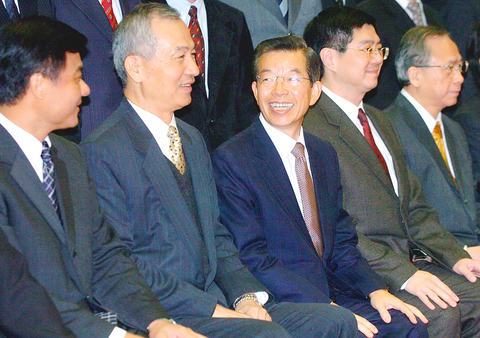Premier Frank Hsieh (
Premier-designate Su Tseng-chang (蘇貞昌) and his team will take their oaths of office tomorrow.
Hsieh said that he would most regret not having a chance to file a request to the legislature to re-consider this year's budget proposal and that he did not have a chance to experience the result of the "co-existence" policy that he has been promoting ever since he took office last February.

PHOTO: LO PEI-DER, TAIPEI TIMES
He said that stepping down as premier does not mean the end of "co-existence."
"Although I am now leaving, it does not necessarily mean that this `co-existence' policy failed," he said.
"I will continue to dedicate myself to this country as a civilian," he said.
He stepped down last week to take responsibility for the Democratic Progressive Party's (DPP) losses in last month's three-in-one local government elections.
Hsieh called a final Cabinet meeting yesterday morning, during which he gave a 15-minute long speech expressing his gratitude to his Cabinet members.
The last official document he signed was the resignation letter for himself and his Cabinet members.
Hsieh, however, did not forget to promote the achievements of his Cabinet, including the new labor insurance mechanism and the Alternative Minimum Taxation (
"I'm so glad that we maintained a perfect balance of steady and regular development of the economy, social justice and environmental protection," he said. "I think my fellow Cabinet members did a good job in reaching those goals."
He said that to examine oneself, one must bow first.
"When you bow, you will hear people's voices a lot clearer," he said. "Cold winter will end soon and warm spring will come after."
Although Hsieh said that he will continue to devote himself to the country by writing, delivering speeches and participating in social activities, Cabinet Secretary-General and Spokesman Cho Jung-tai (
Hsieh declined the offer.
"They [Presidential Office officials] were still calling me and asking whether the premier would accept the offer during the premier's speech in today's Cabinet meeting," Cho said. "Actually, the president first offered his invitation to the premier on Jan. 16. But the premier insisted on going his own way to serve the people."
As for the rumor that Cho would campaign for the year-end Taipei mayor's seat on behalf of the DPP, Cho was coy, saying that a rumor remains a rumor.
"I can only say that I will definitely vote instead of being voted upon," he said.

US President Donald Trump yesterday announced sweeping "reciprocal tariffs" on US trading partners, including a 32 percent tax on goods from Taiwan that is set to take effect on Wednesday. At a Rose Garden event, Trump declared a 10 percent baseline tax on imports from all countries, with the White House saying it would take effect on Saturday. Countries with larger trade surpluses with the US would face higher duties beginning on Wednesday, including Taiwan (32 percent), China (34 percent), Japan (24 percent), South Korea (25 percent), Vietnam (46 percent) and Thailand (36 percent). Canada and Mexico, the two largest US trading

AIR SUPPORT: The Ministry of National Defense thanked the US for the delivery, adding that it was an indicator of the White House’s commitment to the Taiwan Relations Act Deputy Minister of National Defense Po Horng-huei (柏鴻輝) and Representative to the US Alexander Yui on Friday attended a delivery ceremony for the first of Taiwan’s long-awaited 66 F-16C/D Block 70 jets at a Lockheed Martin Corp factory in Greenville, South Carolina. “We are so proud to be the global home of the F-16 and to support Taiwan’s air defense capabilities,” US Representative William Timmons wrote on X, alongside a photograph of Taiwanese and US officials at the event. The F-16C/D Block 70 jets Taiwan ordered have the same capabilities as aircraft that had been upgraded to F-16Vs. The batch of Lockheed Martin

China's military today said it began joint army, navy and rocket force exercises around Taiwan to "serve as a stern warning and powerful deterrent against Taiwanese independence," calling President William Lai (賴清德) a "parasite." The exercises come after Lai called Beijing a "foreign hostile force" last month. More than 10 Chinese military ships approached close to Taiwan's 24 nautical mile (44.4km) contiguous zone this morning and Taiwan sent its own warships to respond, two senior Taiwanese officials said. Taiwan has not yet detected any live fire by the Chinese military so far, one of the officials said. The drills took place after US Secretary

THUGGISH BEHAVIOR: Encouraging people to report independence supporters is another intimidation tactic that threatens cross-strait peace, the state department said China setting up an online system for reporting “Taiwanese independence” advocates is an “irresponsible and reprehensible” act, a US government spokesperson said on Friday. “China’s call for private individuals to report on alleged ‘persecution or suppression’ by supposed ‘Taiwan independence henchmen and accomplices’ is irresponsible and reprehensible,” an unnamed US Department of State spokesperson told the Central News Agency in an e-mail. The move is part of Beijing’s “intimidation campaign” against Taiwan and its supporters, and is “threatening free speech around the world, destabilizing the Indo-Pacific region, and deliberately eroding the cross-strait status quo,” the spokesperson said. The Chinese Communist Party’s “threats